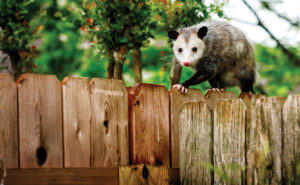
An opossum might eat ticks, but it also could spread ticks on your customer’s property. PHOTO: GALINAST/ISTOCK / GETTY IMAGES PLUS/GETTY IMAGES
QUESTION:
More and more, I am running into customers who are questioning whether they should have me remove opossums from their crawlspaces or attics because they are reading on social media that opossums can get rid of Lyme disease-carrying ticks in their yards. Is this true? —DITHERING ON DIDELPHIDS
ANSWER:
Opossums (Didelphidae) are one of the most interesting species of wildlife we deal with from a biological standpoint. They have some very unusual and cool attributes. But to me, an opossum in your attic or crawlspace is a “whole different animal” from an opossum in your yard or neighborhood.
The benefits of having an opossum in your vicinity are that they are omnivorous and will eat a lot of things we don’t want around. Insects, ticks, rats, mice and even snakes are on their list of top food sources. But the drawback is, so is our garbage. Do they eat ticks and other insects? Yes, but they also will eat bird eggs.
Opossums do not tend to be aggressive — unless you are threatening their young. They are solitary, nomadic and nocturnal, so you aren’t likely to encounter them on a regular basis. They don’t dig into soil to create nesting spaces, but they will utilize existing spaces like that in which to live.
Opossums have ectoparasites, such as fleas, ticks and mites, that can cause issues. They can carry diseases such as tularemia. They are not generally known for being very susceptible to rabies. But when they “play ’possum,” they often foam at the mouth, which may give the impression they have rabies.
I have dealt with some pretty severe issues over the years with fleas and mites after the departure of a nomadic opossum from crawlspaces. So away from your home, in your neighborhood? I would say that opossums are going to leave you alone, so it’s OK to leave them alone. In the crawlspace or attic, or under the deck? You are better off taking care of the issue and making sure you do not have ectoparasite issues afterward.
Of course, the best remedy for this is to be proactive around your customers’ homes to help them identify the potential entry points and harborage sites for opossums before they take up residence. If an opossum can get in, a lot of other things — including other species of wildlife — can get in, too.
Opossum fun facts
Opossums’ cool attributes include:
- They are North America’s only marsupial, so they are “cousins” with the kangaroo. Their young are called joeys, just like kangaroo young.
- The Virginia opossum (Didelphis virginiana) is the only species of opossum found in the U.S. and Canada.
- The Virginia opossum is immune to the venom of rattlesnakes.
- “Playing ’possum” is a reflex they can’t control. When frightened, basically they faint and will remain that way for as long as four hours.
- An article widely circulated on social media from the National Wildlife Federation states that a single opossum will eat 5,000 ticks over a summer. I could not find any peer-reviewed source material on that specific number, but I have no contrary data that would make me disbelieve it.
Email your questions about insect identification and pest management technologies to pmpeditor@northcoastmedia.net. Your questions most likely will be printed and answered in one of Pest Management Professional’s upcoming columns.
BLACK is a PMP Hall of Fame member (Class of 2019) and VP of quality assurance and technical service for Rollins Inc. She may be reached at jblack@rollins.com.
Leave A Comment